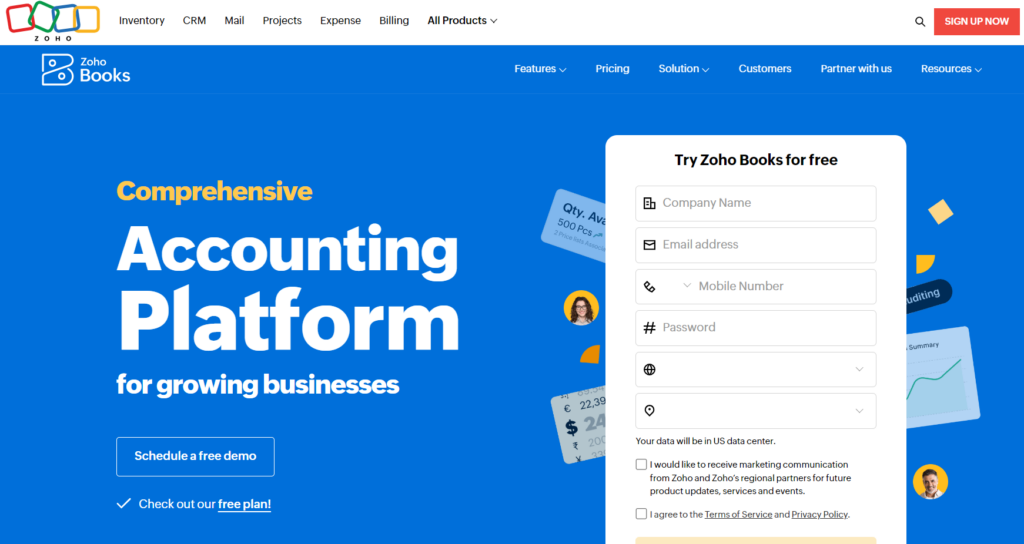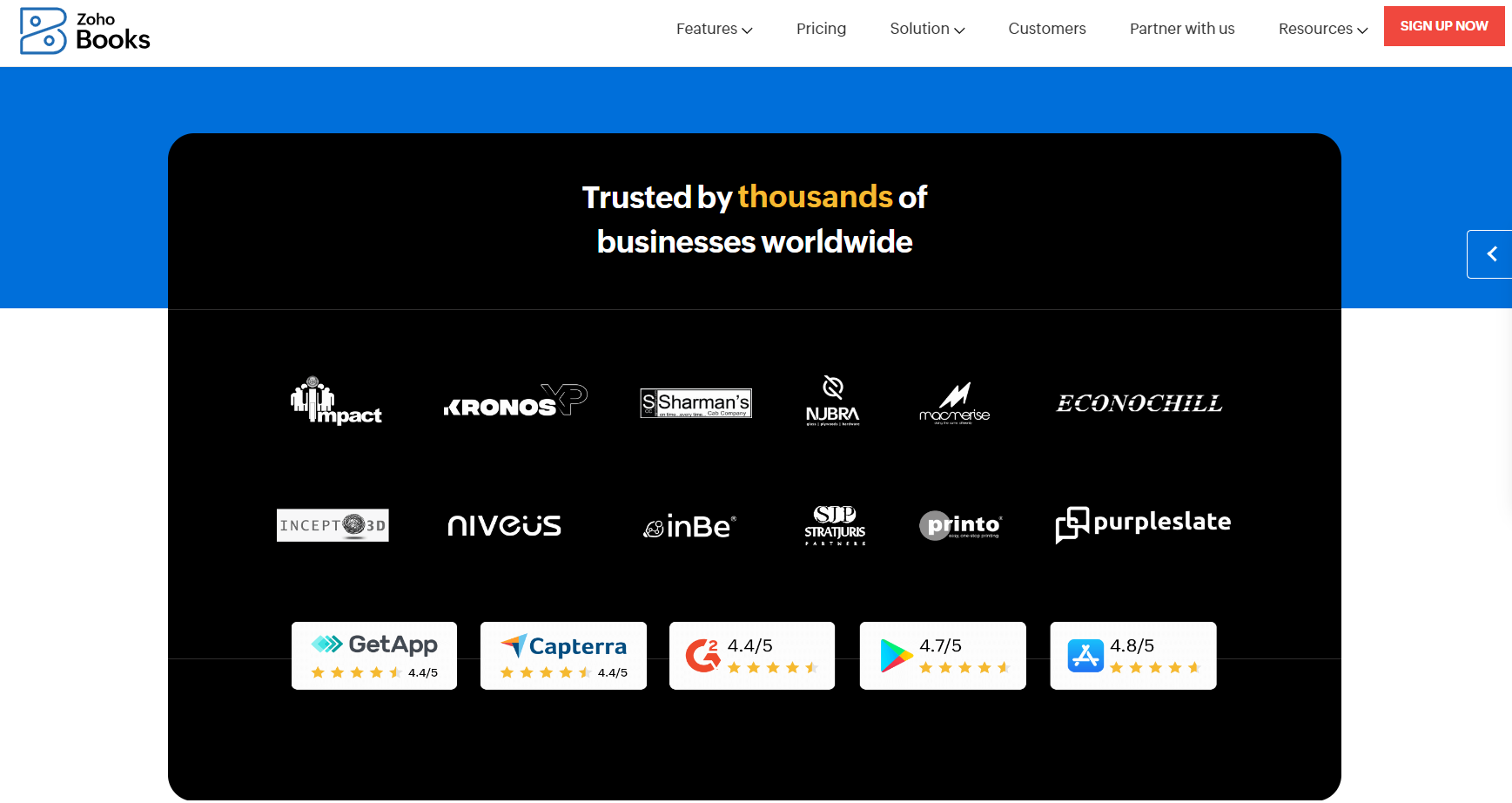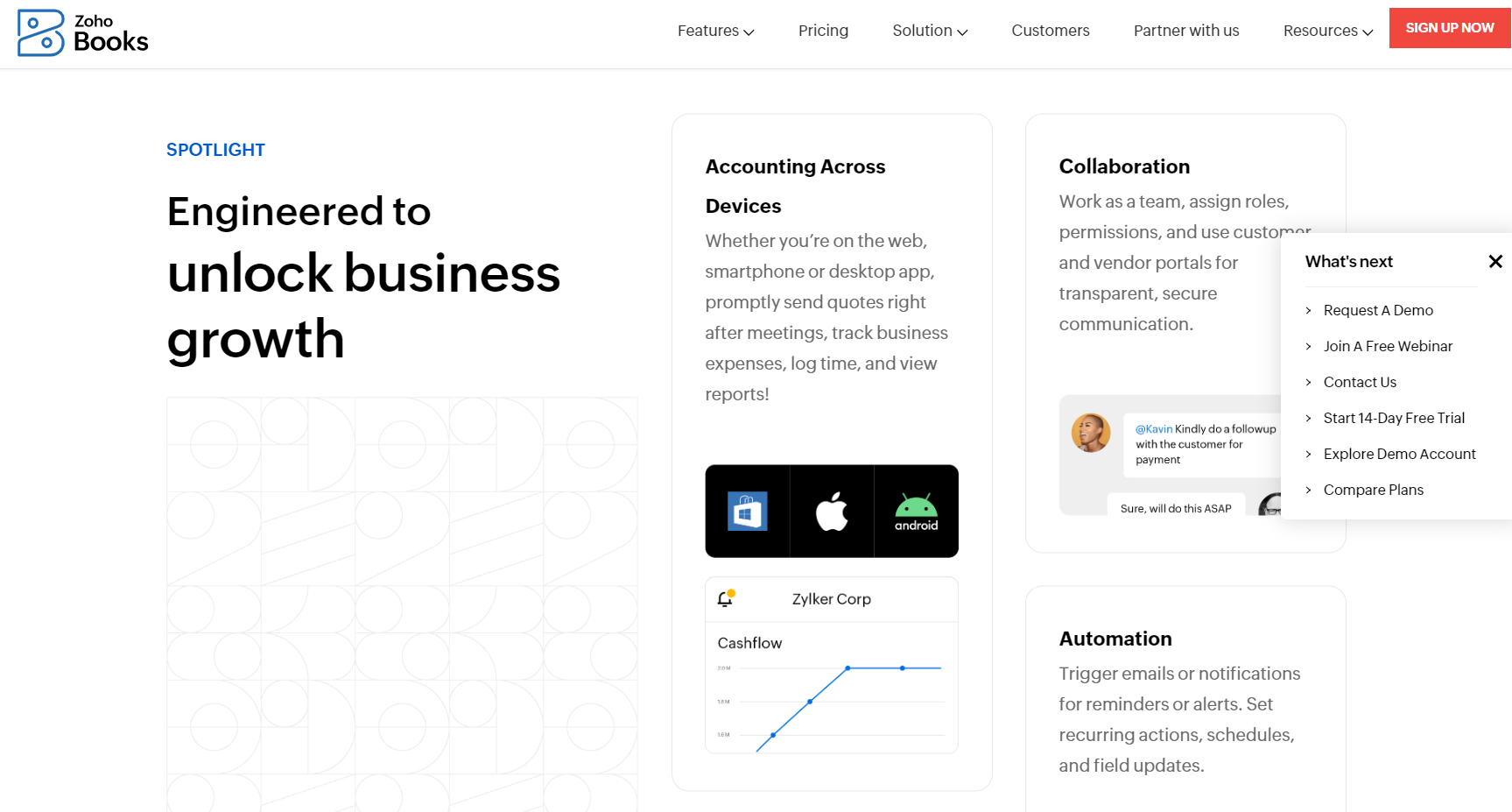Our Verdict

In the comparison between Zoho Books and Sage Business, each platform demonstrates distinct strengths in catering to the diverse needs of businesses. Zoho Books excels with its user-friendly interface, comprehensive invoicing and expense tracking features, and seamless integration with other Zoho applications, offering a holistic and streamlined accounting experience. Conversely, Sage Business stands out with its robust reporting and analytics capabilities, advanced inventory management functionalities, and multi-currency support, providing a powerful solution for businesses with complex financial requirements.
While both platforms provide essential accounting tools, Zoho Books prioritizes accessibility and simplicity, making it ideal for small to medium-sized businesses seeking efficient financial management. On the other hand, Sage Business targets businesses with more intricate financial operations, offering extensive features for in-depth financial control and analysis.
Ultimately, the choice between Zoho Books and Sage Business hinges on the specific needs and scale of your business, with Zoho Books emerging as the preferred option for user-friendliness and seamless integration, while Sage Business caters to businesses requiring advanced financial capabilities and comprehensive reporting.
Why Choose Zoho Books

Who Zoho Books Is Best For
Zoho Books is the ideal choice for you if you:
- Seek an affordable and scalable accounting solution that caters specifically to the needs of small to medium-sized businesses looking for comprehensive financial tools.
- Require robust invoicing and billing features that can be customized to reflect your brand and streamline your payment collection processes.
- Need integration capabilities with other Zoho products and various third-party applications to enhance your business operations and data connectivity.
- Desire a cloud-based accounting solution that provides accessibility and flexibility for managing your finances from anywhere.
- Want access to real-time financial reporting and analytics to make informed decisions and monitor your business continuously.
Who Zoho Books Is Not Right For
Zoho Books might not be the right choice for you if you:
- Require a software platform that supports an unlimited number of users, as Zoho Books caps the number of users even at its highest plan levels.
- Need extensive customization capabilities for financial reports beyond the standard templates provided by Zoho Books.
- Prefer an accounting software with a more traditional or extensively customizable user interface, as Zoho Books offers a modern, but relatively fixed, user experience layout.
- Seek deep integration capabilities with a wide range of third-party applications not supported by Zoho’s ecosystem.
- Desire advanced features such as detailed project accounting or industry-specific functionalities without upgrading to higher-cost plans.
>>> MORE: Zoho Books vs NetSuite
Why Choose Sage Business

Who Sage Business Is Best For
Sage Business is the ideal choice for you if you:
- Desire a platform with extensive multicurrency support, making it ideal for businesses operating internationally.
- Require advanced inventory management tools that integrate seamlessly with accounting features to keep track of stock levels accurately.
- Seek robust financial management solutions capable of handling complex accounting needs across multiple industries.
- Want to utilize sophisticated reporting and analytics tools to gain deeper insights into your business performance and make data-driven decisions.
- Need comprehensive integration capabilities with a wide range of third-party applications to enhance operational efficiency.
Who Sage Business Is Not Right For
Sage Business might not be the right choice for you if you:
- Seek an affordable entry-level accounting solution, as Sage Business can be more costly compared to some alternatives, especially for startups or small businesses with tight budgets.
- Require a user interface that is highly intuitive and easy to navigate without a learning curve, particularly if you are not accustomed to complex accounting software.
- Prefer a simpler, more basic tool for managing personal finances or small-scale business operations without the need for extensive features.
- Want a quick setup without the need for in-depth customization or configuration, which can be necessary to fully leverage Sage Business’s capabilities.
- Desire minimal integration or operate in a niche where specific third-party applications are not essential for your business operations.
Zoho Books vs Sage Business: Main Differences
Ideal For
Consider Zoho Books if you are a small to medium-sized business seeking an affordable and user-friendly accounting software with comprehensive features to manage your finances efficiently. It excels for businesses that value intuitive interfaces, robust mobile access, and cost-effective pricing structures, making it an ideal choice for entrepreneurs and growing companies focused on scalability and ease of use.
Opt for Sage Business if your business requires advanced accounting capabilities, particularly if you engage in international transactions or need extensive inventory management features. Sage Business is suited for larger businesses or those with more complex accounting needs, offering deep integrations with other software and sophisticated customization options to support a broad range of industries. Sage’s comprehensive approach is perfect for established companies looking for a robust system to streamline their financial operations.
Pricing
When comparing the pricing of Zoho Books and Sage Business, it’s important to note that both offer free trials, with Zoho Books providing a 14-day trial and Sage Business offering a 30-day trial. In terms of the cheapest plan, Zoho Books’ Standard plan costs $70 per month, while Sage Business’s Pro Accounting plan is priced at $96.58 per month. Additionally, both Zoho Books’ Premium plan and Sage Business’s Premium Accounting plan are priced at $70 per month. However, when considering the top-tier plans, Zoho Books’ Ultimate plan costs $275 per month, whereas Sage Business’s Quantum Accounting plan is priced at $160 per month.
Integrations
Zoho Books and Sage Business both provide an array of integrations to optimize accounting processes, though they cater to slightly different sets of additional functionalities:
Zoho Books offers robust integrations with various payment processing systems including Stripe, PayPal, Authorize.Net, Square, 2Checkout, Braintree, and CSG Forte. This extensive support for payment gateways enables businesses using Zoho Books to easily accept payments from a wide range of methods, improving transaction efficiency and customer convenience. Additionally, Zoho Books integrates with Zendesk, enhancing customer service capabilities by linking support tickets directly with billing and accounting.
On the other hand, Sage Business extends its integration capabilities beyond payment processing to include tools like Avalara for tax compliance, VeriClock for time tracking, Paya for further payment solutions, and Zynk for advanced data integration. Sage also integrates with MISys for manufacturing management and eBridge for broader ERP connectivity, catering to businesses that require more complex operational tools alongside their accounting software.
Standout Features
Zoho Books stands out with its exceptionally user-friendly interface that caters especially well to small and medium-sized businesses. It offers automated workflows that simplify complex accounting tasks, real-time tracking of invoices and expenses, and a mobile application that allows users to manage their finances on the go. Furthermore, Zoho Books is notable for its seamless integration within the Zoho ecosystem, enhancing productivity by connecting various business functions.
In contrast, Sage Business distinguishes itself with its robust feature set designed for handling more complex business requirements. It excels in offering extensive customization options and scalable solutions that can grow with your business. Sage’s standout features include advanced inventory management capabilities, comprehensive multi-currency support, and powerful integrations with a wide range of third-party applications, making it particularly suitable for larger businesses or those with complex operational needs.
Both Zoho Books and Sage Business provide distinctive advantages, making them suitable for different types of businesses based on size, operational complexity, and specific financial management needs.
Zoho Books vs Sage Business: Standout Features
Zoho Books

- Simplifies financial management with user-friendly interface and seamless integration within the Zoho ecosystem.
- Offers collaborative tools for efficient team communication and project management within the platform.
- Provides mobile access for on-the-go financial management and real-time decision-making.
- Empowers users with advanced invoicing, expense tracking, and customizable reports for comprehensive financial insights.
- Streamlines bank reconciliation and tax management processes, ensuring accuracy and compliance.
Sage Business

- Ensures high product quality and reliability, giving you confidence in the products you source.
- Provides comprehensive reporting and analytics functionalities to support large-scale operations.
- Delivers robust reporting and analytics capabilities for in-depth financial control and analysis.
- Provides multi-currency support for international transactions and extensive inventory management features.
- Offers advanced financial functionalities tailored for businesses with complex financial requirements.
>>> PRO TIPS: QuickBooks Invoicing vs KashFlow
Pros and Cons of Zoho Books

Pros
- Simplifies setup for quick and easy platform adoption.
- Provides direct access to powerful accounting tools and financial management.
- Offers extensive customization options for invoices and reports.
- Supports integration with a wide range of apps for seamless operation.
- Grants access to real-time financial data and insights for informed decisions.
- Includes robust mobile apps for managing finances on-the-go.
Cons
- Limits the number of users in its plans, which may not be sufficient for larger businesses.
- Lacks some advanced features in lower-tier plans, requiring upgrades for enhanced functionalities.
- Offers a shorter free trial period compared to some competitors.
- Requires an internet connection for access since it is cloud-based.
Pros and Cons of Sage Business

Pros
- Offers powerful inventory management tools.
- Supports customizable reporting capabilities.
- Delivers cloud-based accessibility for anytime, anywhere management.
- Enables streamlined financial management with advanced features.
- Provides multi-currency support for international transactions.
- Integrates seamlessly with numerous third-party applications, including CRM and ERP systems.
Cons
- Requires a higher initial learning curve due to comprehensive features.
- Can be more expensive, particularly for small businesses or startups.
- May include fees for additional users or modules, increasing costs.
- Lacks a more modern or intuitive user interface compared to newer solutions.
Zoho Books vs Sage Business: Customer Reviews
Based on user reviews, Zoho Books stands out with a solid 4.7 out of 5 stars on TrustPilot, praised for its user-friendly interface, strong customer support, and affordability. Users particularly appreciate its seamless integration with other Zoho apps. However, some reviewers note limitations in advanced accounting features and a shorter free trial period compared to other software options.
On the other hand, Sage Business earns a respectable 4.3 out of 5 stars on TrustPilot, lauded for its robust features and scalability for growing businesses. While it caters to those needing powerful features, some users find it less intuitive and report occasional customer service hiccups.
Ultimately, the choice between Zoho Books and Sage Business depends on your specific needs. Zoho Books excels in user-friendliness and affordability, making it a great choice for those seeking a seamless and cost-effective accounting solution. On the other hand, Sage Business caters to users requiring powerful features and scalability for growing businesses.
Zoho Books vs Sage Business Competitors
While Zoho Books and Sage Business are strong contenders, several competitors offer compelling features and pricing options:
FreshBooks: Known for its simplicity and affordability, FreshBooks caters well to freelancers and small businesses. It’s a great choice if you value a user-friendly interface and budget-conscious pricing.
QuickBooks Online: A user-friendly giant, QuickBooks Online boasts a massive user base and seamless integrations with popular business tools. Consider it if you prioritize ease of use and a vast ecosystem.
Xero: This cloud-based accounting software shines with its beautiful interface, strong inventory management features, and automatic bill payments. Explore Xero if a modern design and advanced inventory features are high on your list.
Wave: This free accounting software can be a lifesaver for freelancers and solopreneurs with basic accounting needs. However, its feature set is limited compared to paid options.
>>> GET SMARTER: Zoho Books vs Wave
Pro Tips

- Utilize customizable invoicing features to enhance branding and streamline payments.
- Explore the Zoho ecosystem for integrated business operations.
- Maximize advanced inventory management tools to optimize ordering.
- Leverage automated bank feeds and reconciliation to save time and ensure accuracy.
- Take full advantage of multicurrency capabilities for international operations.
- Integrate with third-party applications to enhance functionality and workflows.
- Reach out to customer support for setup and customization assistance.
Recap
When comparing Zoho Books and Sage Business as accounting software options, it’s essential to assess your business’s specific accounting needs. Zoho Books is highly regarded for its user-friendly interface and affordability, making it an excellent choice for small to medium-sized businesses that need efficient, straightforward financial management.
It offers a variety of integration options within the Zoho ecosystem, enhancing its utility. On the other hand, Sage Business caters to more complex business requirements with robust features like advanced inventory management, extensive third-party integrations, and powerful customization capabilities, suitable for larger businesses or those with more intricate operations.
To make an informed decision, consider the complexity of your accounting needs, the scale of your operations, and the specific features that each platform offers to best support your business goals.













